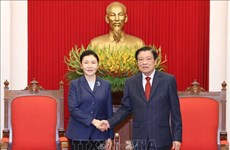Russian vows strong surgery technical transfer
Russia ’s S.N. Fyodorov Eye Micro surgery Complex chief pledged
transfer of technology and high quality services for Vietnam ’s
ophthalmological industry, in Hanoi on April 27.
Russia ’s S.N. Fyodorov Eye Micro surgery Complex chief pledged
transfer of technology and high quality services for Vietnam ’s
ophthalmological industry, in Hanoi on April 27.
The pledges made by Prof. Dr. Khristo Takhchidi, the complex general director, to State President Nguyen Minh Triet on the first day of his five-day visit to Vietnam , included stronger cooperation and application of advanced ophthalmological technology on a larger scale.
He highlighted the establishment of the Excimer Laser Department to treat refractive eye disorders at the Vietnam-Russia Ophthalmology Hospital in Hanoi and the transfer of technology for treatment of children’s amblyopia as evidence.
The Hanoi-based Vietnam-Russia Ophthalmology Hospital has provided medical check-ups and treatment for some 31,000 patients over the past two years.
“The Fyodorov Eye Micro-surgery Complex would do its best to fulfil the mission as a supplier of ophthalmological services based on high technology for Vietnamese people”, the Russian ophthalmologist said.
Khristo Takhchidi’s visit was welcomed by President Triet as a considerable contribution to stronger relations between the ophthalmological sector in particular and medical services in the two countries in general.
Russia is a strategic partner and a loyal friend of the Vietnamese people, the State President emphasised, highlighting the training of many generations of Vietnamese medical doctors by the former Soviet Union and Russia .
Triet also hailed services provided by the Vietnam-Russia Ophthalmology Hospital , which has benefited many thousands of Vietnamese patients, including thousands of critical cases.
The hospital’s humanitarian services have also brought light to a number of disadvantaged patients who were unable to afford high-quality medical services.
The State leader warmly welcomed the initiative to set up another joint-venture ophthalmological hospital, in Ho Chi Minh City, and called for a similar move to other localities as well as further transfer of technology in order to increase the number of beneficiaries of Russian hi-tech medical services./.
The pledges made by Prof. Dr. Khristo Takhchidi, the complex general director, to State President Nguyen Minh Triet on the first day of his five-day visit to Vietnam , included stronger cooperation and application of advanced ophthalmological technology on a larger scale.
He highlighted the establishment of the Excimer Laser Department to treat refractive eye disorders at the Vietnam-Russia Ophthalmology Hospital in Hanoi and the transfer of technology for treatment of children’s amblyopia as evidence.
The Hanoi-based Vietnam-Russia Ophthalmology Hospital has provided medical check-ups and treatment for some 31,000 patients over the past two years.
“The Fyodorov Eye Micro-surgery Complex would do its best to fulfil the mission as a supplier of ophthalmological services based on high technology for Vietnamese people”, the Russian ophthalmologist said.
Khristo Takhchidi’s visit was welcomed by President Triet as a considerable contribution to stronger relations between the ophthalmological sector in particular and medical services in the two countries in general.
Russia is a strategic partner and a loyal friend of the Vietnamese people, the State President emphasised, highlighting the training of many generations of Vietnamese medical doctors by the former Soviet Union and Russia .
Triet also hailed services provided by the Vietnam-Russia Ophthalmology Hospital , which has benefited many thousands of Vietnamese patients, including thousands of critical cases.
The hospital’s humanitarian services have also brought light to a number of disadvantaged patients who were unable to afford high-quality medical services.
The State leader warmly welcomed the initiative to set up another joint-venture ophthalmological hospital, in Ho Chi Minh City, and called for a similar move to other localities as well as further transfer of technology in order to increase the number of beneficiaries of Russian hi-tech medical services./.













